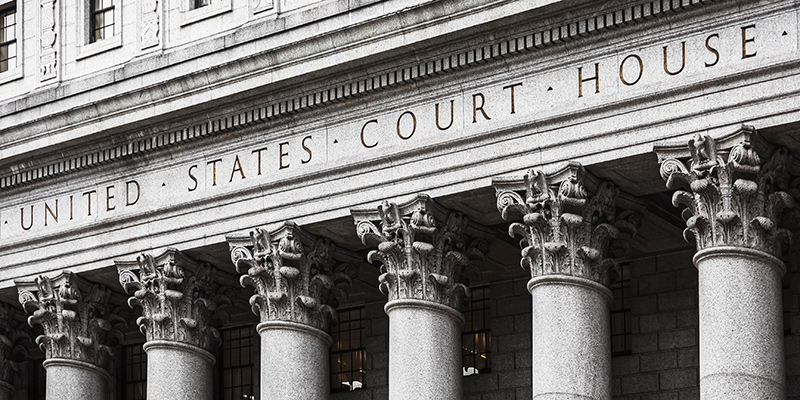eNews January 30
In the News
January 30, 2020
Senate Approves, Trump Signs USMCA
—Michael Miller, managing editor
A new trade deal between the U.S., Mexico and Canada was approved by the U.S. Senate in mid-January. The Senate passed the U.S.-Mexico-Canada Agreement (USMCA) to replace NAFTA 89-10, with both Democrats and Republicans approving the deal. U.S. President Donald Trump signed the deal on Jan. 29.
The 1600 Daily, a newsletter from the White House, cited then-presidential candidate Barack Obama, saying, “NAFTA’s shortcomings were evident when signed and we must now amend the agreement to fix them.” And, according to the 1600 Daily, USMCA will do just that, adding up to $235 billion in new economic growth as well as nearly 600,000 jobs to the U.S. economy.
“The two biggest areas of change were imposition of rules and regulations mostly on Mexico and, to a certain extent, on Canada that revolve around labor rights and environmental concerns,” said NACM Economist Chris Kuehl, Ph.D. “In order to get the agreement through Congress, Democrats demanded both those things. As a result, it will now allow U.S. inspectors to go into Mexico and make sure labor situations are OK. A little bit of that will affect Canada but not much.”
The other change in USMCA was the approach to the domestic content laws in the automotive sector. This is not as big of a deal as people are making it out to be, Kuehl said, because domestic means any of the three countries—U.S., Mexico or Canada. “It’ll make it more difficult for Japan, Korea and Germany, but mostly for the European countries because Japan produces stuff here to get around restrictions—the Germans don’t do as much. Volkswagen and BMW are a little worried; they have plants here but bring parts from Germany,” Kuehl added.
The new agreement likely won’t have a huge impact on credit professionals and credit departments, but it should make life a little easier when using financials from Mexican businesses. “One of the challenges for credit people is trying to make sense of financials out of Mexico,” Kuehl continued. “It’s difficult to track down who knows what—Mexican credit information will be more reliable because companies have to submit to U.S. inspections.”
Kuehl believes the new agreement takes a little bit of mystery out of dealing with the automotive sector. “This kind of settles the issue. I don’t think there will be much of a change with textiles and food, but those really weren’t important parts of the agreement.”
Mexico has already approved the pact, but Canada must still ratify the deal.

Letters of Credit Webinar Series—Get the Most out of Letters of Credit
FCIB is kicking off a series of webinars that will help credit professionals understand and use export letters of credit more effectively. Veteran international banker Chip Thomas will share practical techniques and insight for getting the most out of them.
Feb 13: Understanding the Letter of Credit Process: What Every Exporter Needs to Know
Mar 12 : Roles and Responsibilities of Banks in the Payment Process
Apr 9: Letter of Credit Documentation: How to Avoid Discrepancies
May 14: Choosing the Right INCOTERMS for Letters of Credit: Why International Commercial Terms Matter and the Role They Play
Beyond Filing an Affidavit of Nonpayment in Georgia After New Court of Appeals Ruling
—Christie Citranglo, editorial associate
Near the end of 2019, Georgia’s Court of Appeals made an immediate and retroactive ruling that affected the role of affidavits of nonpayment when filing a lien. Now, if an affidavit of nonpayment is not filed after a lien waiver document is signed, the supplier’s claim against the owner is invalid, and so is the supplier’s claim against its own customer.
With this change, creditors working with customers in Georgia need to be more diligent about filing affidavits of nonpayment. The consequences of failing to file an affidavit of nonpayment go beyond just lien rights, and creditors will not only have to be scrupulous but also creative moving forward.
“Now that this has been put into place, I think the issue is what can we do and what can claimants do to somehow minimize the damage if they’ve already executed the waivers?” said David Merbaum, an attorney with Merbaum and Becker in Alpharetta, Georgia. “You’ve got to be a little creative and think outside of the box and come up with some arguments.”
Merbaum first suggests filing the affidavit of nonpayment before anything goes awry. Should the creditor forget to file or should the case demand more creative thinking, Merbaum has methods creditors can use to approach this situation.
Often, the waivers are emailed or faxed over to each party, and no original copies are mailed. Should creditors be relying on these copies, they should state in the email or fax that the copies are “held in trust,” making the waivers ineffective until an original one is circulated. Should this waiver be a sticking point in the future, creditors can argue an original waiver was never sent, which will not give up their lien rights.
In Georgia, prospective lien rights are not enforceable, giving creditors another means to recover lien rights. The lien waivers subcontractors give are typically dated through the end of the month, but they are usually not executed until the middle of the month. This gives creditors roughly a two-week window where work has not been completed and materials have not been furnished, and yet, the waiver goes until the end of the month. Merbaum said creditors can argue this two-week period falls into the category of a prospective lien waiver, making this new ruling ineffective.
Lastly, Merbaum suggests creditors not fill out forms themselves. If the subcontractor asked the creditor to fill it out, the creditor should refuse and have the other party fill it out instead. If the subcontractor makes a mistake on the form or leaves something blank, the creditor can send the form back without notarizing it. That way, if the subcontractor tries to use the form, the creditor can argue it’s invalid because something on the form was incorrect.
If a creditor does not file an affidavit of nonpayment in Georgia, there still remains a bit of hope—should the creditor get a little inventive.
“I hope there’s enough information out there that if they really get burned you don’t throw your hands up,” Merbaum said. “Give it a shot: What do you have to lose?”

Nominate a Special Credit Professional
Do you know anyone working in the field of credit management whose professional life displays unquestioned integrity, outstanding and meritorious service in the field, and ongoing dedication to the highest standards of the profession? The National Association of Credit Management Honors and Awards have become an important mechanism by which we recognize our colleagues for their outstanding efforts and unwavering commitment. Nominate a colleague now!
NACM’s 2020 award recipients will be honored at the annual Credit Congress & Exposition. Credit Congress is taking place at Caesars Palace in Las Vegas June 14-17, 2020. The deadline for all nominations is February 7, 2020.
Visit www.nacm.org/honors-a-awards.html to learn more and to nominate your choice.
Visit www.nacm.org/honors-a-awards.html to learn more and to nominate your choice.
Coronavirus ‘Rattles’ Chinese Economy
—Andrew Michaels, editorial associate
The coronavirus is spreading throughout China and into other countries, but it is the former that is beginning to see the economic impacts of the new and dangerous disease. Many news outlets are reporting a decline in China’s economic growth for 2020, a mere three weeks after the coronavirus started.
First reported to the World Health Organization as several cases of pneumonia on Dec. 31, Al Jazeera reported, it was only a week later when the country identified the coronavirus. As of Jan. 28, nearly 6,000 cases were confirmed in China and more than 50 were identified in 15 other countries, including five cases in the U.S. Chinese officials said 132 people have died.
Among the economists weighing in is Wells Fargo, who released a report on Jan. 29. According to Wells Fargo’s analysis, there is “a high probability” China’s economic growth will drop from 5.9% to 5.8% following the outbreak. The virus has “rattled” investors across Asia, where equity indices are dropping. Economists said they predict—with 70% to 80% probability—that the outbreak will get “mildly worse in the near-term” as the Chinese government takes the necessary precautions to stabilize the economy.
“With the outbreak occurring during the Chinese Lunar New Year—a peak time for travel and consumer spending—we expect the virus to have a slight impact on China’s growth prospects,” Wells Fargo reported. “As far as the Chinese currency, we believe the renminbi will eventually strengthen and are comfortable with an outlook for modest CNY strength over the medium-term. We also believe emerging Asian currencies will begin to strengthen.”
Wells Fargo anticipates the euro will modestly strengthen from current levels; however, the U.S. dollar is expected to weaken when “demand for the safe haven qualities of the greenback dissipate.”
NACM Economist Chris Kuehl, Ph.D., said there are four elements whose combination could threaten global economic activity: the unknown factor of the disease; the limited alternatives to isolation and inspection; government responses; and the cost of reacting to and treating the disease.
“The initial response has been to radically curtail travel to China, affecting export and import activity right away. The level of investment in China had been dwindling in the last few years due to the trade war, adding to recent concerns,” Kuehl said. “There will be millions spent on dealing with the potential outbreak in other parts of the world. Travel will be affected as people will not want to risk exposure.”
Furthermore, he said, the medical community will have to address the issue, which is difficult considering they weren’t prepared for the virus—there are few who are familiar with it.
New York City-based insurance company Marsh states organizations with a high employee count are especially at risk due to ongoing “travel restrictions, supply chain disruptions and employee absenteeism within vendors, suppliers and other partners in-country,” therefore, impacting productivity and efficiency for its businesses in other areas. Marsh recommends companies pay attention to travel policies, employee wellbeing and supply chains, while educating themselves on their insurance coverage.
“Multinational organizations should review, test and potentially update critical plans related to business continuity, crisis management and crisis communications,” the insurance company announced. “While examining existing plans, consider the potential effects a worsening outbreak could have on employees, revenue, suppliers, reputations and more, and work with other stakeholders to prepare accordingly.”

Credit Law—Now Available on the CLC!
This course will teach you the legal concepts directly applicable to credit decisions and the extension of credit. Learn about the different corporate structures, commercial transactions such as establishing customer relationships and various payment methods, as well as laws and regulations which includes the ECOA, antitrust, escheatment and more.
Practicing expert attorneys join the discussion, bringing in real-time examples of the law in practice to help students immediately understand the impact of legal concepts presented on day-to-day credit decisions and responsibilities. Listen to the experts as they answer questions about the legal aspects of the credit application, security agreements, letters of credit, and many other topics.
This course satisfies one of the two required CBF courses. Visit the Credit Learning Center (CLC) or contact the NACM Education Department at This email address is being protected from spambots. You need JavaScript enabled to view it. or 410-740-5560 to learn more.
This course satisfies one of the two required CBF courses. Visit the Credit Learning Center (CLC) or contact the NACM Education Department at This email address is being protected from spambots. You need JavaScript enabled to view it. or 410-740-5560 to learn more.
U.S. Supreme Court: Creditors May Immediately Appeal Denials of Automatic-Stay Relief
—Brad Erens, Esq., Kevin Marshall, Esq., and Chris DiPompeo, Esq.
On Jan. 14, 2020, the U.S. Supreme Court held in Ritzen Group, Inc. v. Jackson Masonry, LLC, 589 U.S. __ (2020), that bankruptcy court orders conclusively denying relief from the automatic stay (11 U.S.C. § 362(a)) are appealable. The decision provides important guidance to bankruptcy courts, practitioners and parties on the oft-recurring issues of taking and preserving bankruptcy appeals.
When a land sale fell through, Ritzen Group sued Jackson Masonry in state court. Days before trial, Jackson filed for Chapter 11 bankruptcy, which automatically stayed the state court litigation. Ritzen sought relief from the stay, which the bankruptcy court denied. Instead of appealing, Ritzen filed a proof of claim and pursued its contract dispute in an adversary proceeding in the bankruptcy court. That court ruled against Ritzen, disallowed its proof of claim and confirmed a plan enjoining all creditors (including Ritzen) from suits related to prepetition claims.
Ritzen then filed two separate appeals—from the bankruptcy court's decision on its contract claims and from the court's denial of relief from the automatic stay. Both the district court and the Sixth Circuit held (consistent with the majority view of the circuits) that the order denying stay relief had been immediately appealable, which made Ritzen's appeal untimely. (Both courts also rejected Ritzen's contract claims.)
Justice Ginsburg delivered the opinion for a unanimous court, affirming on the question of appealability. The Court relied heavily on its 2015 opinion in Bullard v. Blue Hills Bank, 575 U.S. 496. In Bullard, as Ritzen explained, the Court had held that an order rejecting a proposed Chapter 13 plan was not "final" under 28 U.S.C. § 158(a) because a motion to confirm a plan was one step in a broader "plan-confirmation process" and thus the order "did not conclusively resolve the relevant 'proceeding.'" Under Bullard, "orders in bankruptcy cases may be immediately appealed if they finally dispose of discrete disputes within the larger case," fixing the rights and obligations of the parties. 575 U.S. at 501.
Applying that rule, the Court in Ritzen held that, as a category, "the adjudication of a motion for relief from the automatic stay forms a discrete procedural unit within the embracive bankruptcy case," which makes an order conclusively resolving such a motion appealable—and made Ritzen's appeal untimely. The Court rejected Ritzen's argument that such orders are merely a preliminary step of an overall claims adjudication process, noting their potentially significant consequences. The Court also expressed its belief (in response to Ritzen's argument) that its decision would "avoid … 'delays and inefficiencies'" by allowing appellate consideration of automatic stay issues as they occur (quoting Bullard, 575 U.S. at 504).
The Court's decision is important because the practical consequences of orders denying stay relief can be significant. For example, in large Chapter 11 cases, secured creditors often move for relief from the automatic stay to obtain adequate protection for the value of their collateral during the bankruptcy case. If orders denying such motions were not immediately appealable, secured creditors might not be able to pursue appellate review as to their particular issues until the bankruptcy case ended, at which point the value of their collateral might have substantially diminished.
The Ritzen opinion also might further clarify other circumstances in which a contested matter will be sufficiently distinct to qualify under Bullard as an independent "proceeding" that, once finally decided, can—indeed, must—be immediately appealed. Even so, because stay-relief motions were a relatively easy application of Bullard (as the lower court decisions and the majority view of the circuits confirmed), the Court did not have to grapple much with the line between appealable and nonappealable orders; it merely reiterated, drawing on Bullard, that "disputes over minor details about how a bankruptcy case will unfold" would, of course, not be distinct proceedings.
Thus, questions of what amounts to "a discrete procedural unit," distinct from the "umbrella bankruptcy case" (Ritzen op. 2, 3), will remain (along with questions of finality). Absent on-point precedent or at least judicial consensus, it may be difficult to know whether a contested matter satisfies the rule of Bullard. Such uncertainty creates real risks because appellate deadlines are generally jurisdictional, see Bowles v. Russell, 551 U.S. 205 (2007), and so a failure to appeal can, as the Ritzen Group found, forfeit a later appeal. Parties thus may have an incentive to file appeals any time a contested matter is resolved against them. As a result, Ritzen will likely not be the Supreme Court's final word on this topic.
Brad Erens, Esq., has counseled clients for more than 25 years in some of the most complex and cutting-edge Chapter 11 cases filed in the country. He oversees the Business Restructuring & Reorganization team in Jones Day's Chicago office.
Kevin Marshall, Esq., of Jones Day in DC, provides clients analysis, strategy and advocacy involving novel or complex legal issues, particularly in white collar and other compliance matters and in civil litigation arising out of criminal matters or alleged fraud.
Chris DiPompeo, Esq., of Jones Day in DC, focuses on complex litigation and appellate advocacy in the context of business restructurings and Chapter 11 bankruptcies.

What do I have to do? When do I have to do it?
The STS Lien Navigator has the answers and will guide you through the entire process!
Credit professionals can rely on the Navigator to determine when and how action needs to be taken to protect lien rights across the 50 states, DC and Canada. The real-time Navigator ensures that you’ll always have the current information.
Specific questions are also answered for subscribers through the Navigator Answer Line. The Navigator is a web-based service, accessed through our website and available from any computer with internet access.
Navigating the Way—On Time, Every Time
For more information, call Chris Ring at 410-302-0767 or visit www.nacmsts.com.
For more information, call Chris Ring at 410-302-0767 or visit www.nacmsts.com.



